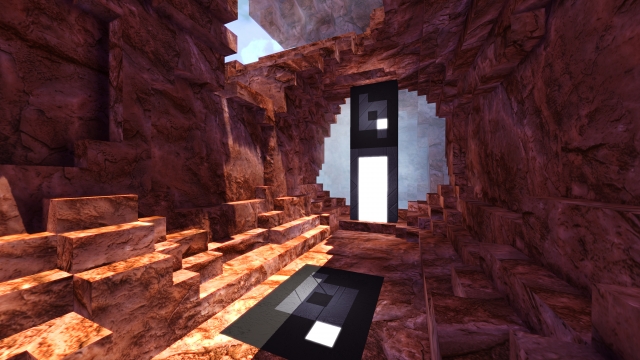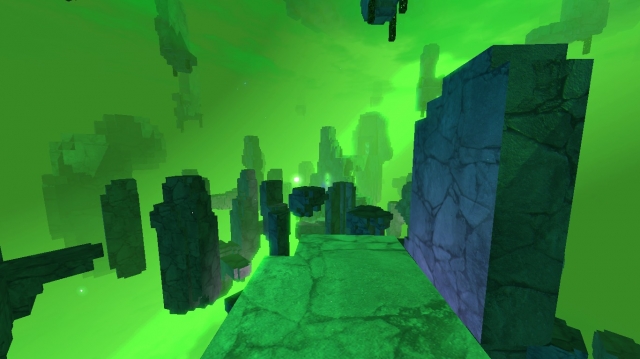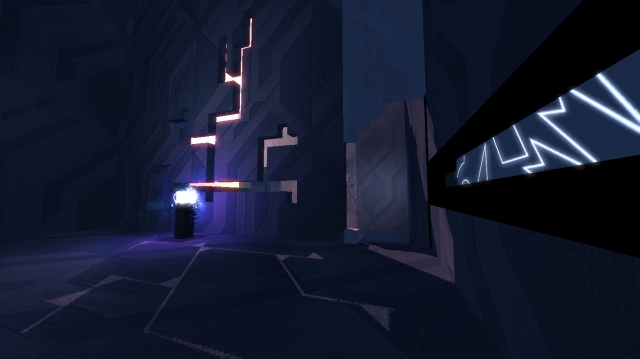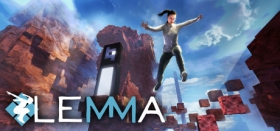
Lemma Review
A tesseract is a concept that was a bit too abstract for me to understand. Not that it matters at all, but since that word is repeated in Lemma so much, it was worth investigating to find out what it is. When I did, that didn’t change how I approached the game or what I took from it. From the way a tesseract is presented, a shiny cube that radiates energy, I couldn’t help expecting any of the Avengers showing up in the videogame with some witty pun. At some points, I would have actually preferred so, since I was barely able to follow a plot that takes itself too seriously. And I have probably got less of it than I think, since so many concepts get lost in a mashup of physics terms and first-person mechanics that struggles to cohere for any average player without graduate studies in quantum physics.
Lemma is a first-person parkour game that draws influences from Mirror’s Edge and Dying Light, among some others that haven’t been able to pop up to the surface to have a name, where you gain valuable momentum as you run jump, climb or bounce from walls. Mirror’s Edge was far from perfect, but I’m still to find another videogame that executes the parkour mechanics so well and cohesively. The levels were mostly linear, and the bits of scenery that you could interact with were cleverly highlighted, making path-finding a piece of cake, and forcing the player to focus on conserving that momentum throughout the run. However, the main problem that Lemma’s mechanics have is, funnily enough, one of the best assets the game has: its openness to different paths. I found myself climbing ledge by ledge, with a clear lack of a continuum in my motion, way too many times to consider this game’s movement fluent and, honestly, fun. The bits that you can climb are quite dispersed from one another in both vertical and horizontal level, making reaching them a puzzle. There would not be a problem with this, but in a game so focused on movement, it is very off-putting having to stop every two steps because you don’t know where to go next.
 Admittedly, there are many paths that will take you to your objective — as poorly indicated as it tends to be, it is usually a tesseract. This and the original and innovative mechanics of this game are indeed one of the strongest elements in this game but they backfired when combined with one another and the awkward level design. Being stone-walled becomes a constant, not only by you not knowing what to do to progress, but also by the disembodied and inanimate enemies that will chase you as your character gets stuck in every ledge. That being said, when the stars align, it is incredibly satisfying to modify the environment by creating walls to run through, or extend walkways to jump from. Lemma, the world you are in, has a malleable geography, making free-running not only a thrilling way to overcome the topography, but also a way to creatively devise a path to the next platform.
Admittedly, there are many paths that will take you to your objective — as poorly indicated as it tends to be, it is usually a tesseract. This and the original and innovative mechanics of this game are indeed one of the strongest elements in this game but they backfired when combined with one another and the awkward level design. Being stone-walled becomes a constant, not only by you not knowing what to do to progress, but also by the disembodied and inanimate enemies that will chase you as your character gets stuck in every ledge. That being said, when the stars align, it is incredibly satisfying to modify the environment by creating walls to run through, or extend walkways to jump from. Lemma, the world you are in, has a malleable geography, making free-running not only a thrilling way to overcome the topography, but also a way to creatively devise a path to the next platform.
The visual style of the game, or at least of the platforms you run around in, is made out of cubes, which certainly can be compared to Minecraft, and clashes a bit with the rest of the elements. And much like Minecraft, you’ll often find yourself connecting various bits of the level, with your wall-construction powers, to provide energy to open a door, move a block, etc. However, the platforms are the only bits that are reminiscent of Minecraft, since the rest of the game’s visuals are shocking due to the different drop-dead colour combinations, and the atmosphere that the reflecting water, the hovering terraces, the foggy sky and suggestive music provide. The music has subtle touches, such as those synth melodies, which connote a sci-fi atmosphere, but that can be tense and agitating when you are being chased after. It also provides the sense of being in another dimension, being the cherry on top to the curiosity this game sparks in you. The sole visual and sonorous shock of the game is enough to keep you playing for most of it, even though you are likely to get lost, not only geographically, but also in its narrative.
 I previously said that Lemma was the world where you find yourself stuck, but this is not exactly true. In some parts of the game, it is understood that it is artificially created, but in some others, it is called it ‘a dream’. I haven’t figured out yet the nature of the world, but I’m very sure it runs along the lines of some physics experiment by a bloke called Mark. You talk to Mark through text messages, because for some reason the area near the tesseracts has always good signal. Anyway, as you progress, you will find notes scattered throughout the levels, which give you quite a bit of background story. They help you build the story in bits, but I never fully understood what actually was happening. At some point, they start introducing characters with little to no information about them, which makes the game even more confusing.
I previously said that Lemma was the world where you find yourself stuck, but this is not exactly true. In some parts of the game, it is understood that it is artificially created, but in some others, it is called it ‘a dream’. I haven’t figured out yet the nature of the world, but I’m very sure it runs along the lines of some physics experiment by a bloke called Mark. You talk to Mark through text messages, because for some reason the area near the tesseracts has always good signal. Anyway, as you progress, you will find notes scattered throughout the levels, which give you quite a bit of background story. They help you build the story in bits, but I never fully understood what actually was happening. At some point, they start introducing characters with little to no information about them, which makes the game even more confusing.
The idea is that our character has entered an alternative realm, and is understood that it is part of some physics experiment. However, the protagonist’s background — she’s an anthropologist — has little to do with the whole science-y terminology and concept of the game. Then it moves to talk about shaping matter and light through just willpower — which obviously links with the game’s main mechanics — and how a whole ship was made to disappear for seconds. There is definitely a storyline here, but it’s a bit vague. It would make sense if the plot forced your imagination with fantastic lore, but since it’s so centred in physics terms and theory, I couldn’t help raise an eyebrow as I read the notes.
 All in all, a tesseract is like a cube, but in four spatial dimensions. It’s to the cube what the cube is to the square. It’s something that probably a mathematician can explain better than me, but has little importance in your life. The abstractness of the concept is exactly what makes it so difficult to understand, and maybe it makes more sense in mathematical context, but not in the way I conceive the world. Well, Lemma is paradoxically very similar to this concept. Too abstract to comprehend, and the only way I see making sense is in a very narrow context, and providing a lot of background information beforehand. This game is not bad; the problem is that both narrative and mechanics get blurry and lost once you mix them with one another.
All in all, a tesseract is like a cube, but in four spatial dimensions. It’s to the cube what the cube is to the square. It’s something that probably a mathematician can explain better than me, but has little importance in your life. The abstractness of the concept is exactly what makes it so difficult to understand, and maybe it makes more sense in mathematical context, but not in the way I conceive the world. Well, Lemma is paradoxically very similar to this concept. Too abstract to comprehend, and the only way I see making sense is in a very narrow context, and providing a lot of background information beforehand. This game is not bad; the problem is that both narrative and mechanics get blurry and lost once you mix them with one another.
Lemma (Reviewed on Windows)
The game is average, with an even mix of positives and negatives.
With a lot of potential, Lemma falls short due its obtuse level design and narrative. However, the mechanics are well-polished and they offer a few good moments of parkour thrill.










COMMENTS